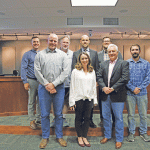A new year means new taxes
Beginning in 2023, employees will notice a new payroll tax on their paychecks. Most employees and employers in the state will be required to pay into and fund the Family and Medical Leave Insurance (FAMLI) program. In 2020, Colorado voters approved FAMLI via a ballot measure with 57.7 percent voting in favor.
The program is designed to give employees up to 12 weeks of paid family or medical leave. FAMLI will operate like an insurance company. Premiums will be paid by employees and employers, and claims will be paid out as needed. Claiming paid leave will be done through the state, not one’s employer. The state, through the FAMLI program, will then provide paid leave at 90 percent of an employee’s average weekly wage up to a maximum of $1,100 a week.
A major caveat is that the program will not begin providing benefits until 2024. Premiums will be collected throughout 2023 to establish and build up the fund before payouts can be made. The premiums collected will be paid by both employees and employers. By law, the premiums are fixed at 0.9 percent of an employee’s wages until 2025. Starting in 2025, and each subsequent year the director of FAMLI will adjust the premium rate to ensure the future viability of the program. However, future premiums are capped at a maximum of 1.2 percent.
Premiums are paid equally by employees and employers. Starting in the new year, employees will pay 0.45 percent of their wages towards the premium, and employers will be required to match that amount. Small employers with nine or fewer employees are not required to pay the employer portion of the premium. But they are still responsible for deducting and remitting the 0.45 percent employee share of the premium.
Two other major exemptions exist for self-employed workers and local government employees. Self-employed workers will not be required to pay into the program. However, they do have the option of joining the program and paying a 0.45 percent premium to be covered. Local governments also have the option of opting out of the program. Almost every municipality in the state has chosen to do this, including larger local governments like Denver, Colorado Springs and Aurora. The Town of Berthoud chose to opt out of the program during their Nov. 22nd board meeting.
Currently, FAMLI plans to provide paid leave in the following situations. Caring for a new child, which includes fostering and adoption. Caring for oneself, if you have a serious health condition. Caring for a family member who has a serious health condition. Making arrangements for a family member’s military deployment. Addressing safety concerns, like finding a new residence, in the event of domestic violence or sexual assault. There is also an additional four weeks of paid leave that can be provided in the event of complications arising from pregnancy or childbirth.
Ten other states, all on the Northeast and West coast, and the District of Columbia offer a state-run family leave program. Colorado will be the first state to create a family leave program after asking voters directly via a ballot measure.
Proponents of paid family and medical leave say that this will help low-income earners and especially women. They point out that the United States is the lone industrialized nation to not offer any national paid leave for any reason.
But many business groups in the state are against a state-mandated family and medical leave program. They argue that it imposes an unnecessary cost on employers and saddles Colorado taxpayers with more liabilities.
Colorado’s FAMLI program is different from the federal Family and Medical Leave (FMLA) Act of 1993. The FMLA provides for unpaid leave due to a new child or a serious health condition. To qualify for leave under FMLA, an employee must have worked for the employer for at least 12 months, have worked 1,250 hours over the past 12 months and work for an employer with at least 50 employees.
Some aspects of Colorado’s FAMLI program remain unclear. The threshold for a serious health condition has yet to be defined. There is also administrative uncertainty with starting a new billion-dollar state-run insurance fund. Another concern is if paid leave income from the program is taxable. The Act creating the program explicitly states that paid leave income is exempt from state taxes. But the Internal Revenue Service has yet to decide if the paid leave income will be taxable at the federal level.
Earlier this year, the program was challenged in court by Chronos Builders LLC, a Grand Junction-based construction company. They argued that the program ran afoul of Colorado’s Taxpayer Bill of Rights. The case was decided last June in front of the Colorado Supreme Court. The Colorado Supreme Court ruled that FAMLI, and its accompanying state legislative Act, is not a state income tax law. They also stated that the premiums collected are fees, not taxes. The case was one of the latest battles over TABOR and the difference between taxes and fees.
- April, 05 2019

Zoo Chateau entertains and educates t...
OUT & ABOUT Photo by Amber McIver-Traywick - Rooney the red kangaroo decides to hop...
- June, 18 2020

Fathers get their day
By Bob McDonnell The Surveyor Mother’s Day was May 10 and Father’s Day is June...
- April, 27 2017

Berthoud’s Brock Voth breaks 25-year-...
By Kristi Leonard The Surveyor Photo by Tiffany RaffertyBrock Voth broke...
- November, 09 2015

Gunshot caused power outage over the ...
By John Gardner The Surveyor Nearly 3,000 Berthoud, Longmont and even a few southern Loveland...
- August, 03 2017

PoliceFiles
Monday, July 24 Vehicle Crash: Spartan Avenue, a construction van ran into the rear of...
- March, 17 2022

Colorado State Patrol seized over two...
While their primary role is to keep people driving legally and safe on the roads,...

Berthoud mulls Downtown Development Authority
Community News
Berthoud takes second in R2J Girls Invitational
Community News
A day in the life as Berthoud’s top cop
Community News
Unified basketball comes to Turner Middle School
Community News

Mike Grace says goodbye as Brett Wing joins town board
Community News
POLICEBLOTTER
Community News
Northern Water sets C-BT quota at 70% for 2024
Community News

Emotions run high during Revere Property hearing
Community News
COMMUNITY CALENDAR:
Community Calendar – add an event
Homestead Fine Art Gallery First Fridays OPEN HOUSE
07 Jun 4:00 PM - 7:00 PM
Homestead Fine Art Gallery First Fridays OPEN HOUSE
05 Jul 4:00 PM - 7:00 PM
Homestead Fine Art Gallery First Fridays OPEN HOUSE
02 Aug 4:00 PM - 7:00 PM
Homestead Fine Art Gallery First Fridays OPEN HOUSE
06 Sep 4:00 PM - 7:00 PM
Homestead Fine Art Gallery First Fridays OPEN HOUSE
04 Oct 4:00 PM - 7:00 PM
Homestead Fine Art Gallery First Fridays OPEN HOUSE
01 Nov 4:00 PM - 7:00 PM

